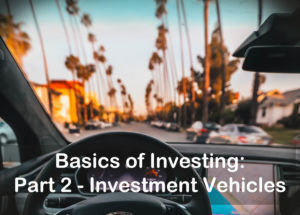The FIRE train is a pretty fun place to be! Last week, we talked about how to open up about FIRE with your partner. This week, we’ll go through the rest.
Here is a way to conceptualize the whole process:
- Start talking about it
- Personalize FIRE
- Exposure
- Dream together
- Compromise
Start talking about FIRE
This one may be obvious, but you’re not going to get anywhere unless you talk about FIRE with your partner. I went into the initial conversation in last week’s post. Below are some other ways the opening foray might occur.
Indirect Approach #1:
Partner A: “Hey, did you know there’s this thing called the FIRE movement? It stands for Financial Independence, Retire Early.”
Partner B: “Huh, never heard of it.”
Silence.
Partner A waits and waits and waits for Partner B to ask them more. There are a variety of reasons why this might or might not happen. But starting to sulk about not be asked is counterproductive. Instead, you could continue with something like this:
“Can I tell you a bit about what I’ve learned so far?
Indirect Approach #2:
Play FIRE related podcasts in the background, while waiting for your partner to ask you about it. Might work! But again, if it doesn’t, just broach the subject directly.
Direct Approach:
“Hey, did you know there’s this thing called the FIRE movement? It stands for Financial Independence, Retire Early. Can I tell you a bit about what I’ve learned so far?”
Personalize FIRE
Referring back to last week’s post, it’s helpful to frame FIRE and financial concepts in terms that would be familiar to your partner. For my friend, she is pretty into shopping (and far from alone in this hobby!). One way to approach talking about ETFs with her could be like how I approached it – in terms of goods that she is interested in.
Instead bombarding your loved one with “TFSA” and “RRSP” and “4% rule” and “compound interest” and “sequence of returns risk mitigation”, try to frame FI(RE) in terms that they use and think about frequently. Like shopping. Or sports. Or music. Or acronyms with a twist. There’s almost always an analogy to be made 😊
I would also recommend double checking your tone of voice. Because if your partner hears criticism of their consumer and/or financial habits, it’s going to start the conversation off on a very bad foot. But, as you’ll see if you follow the link to the wonderful blog, rich and Regular, it’s not the end even if the financial conversation starts on bad footing!
Exposure
In medical school, I was taught that spiral learning is one of the better ways to learn. It’s not about one-time exposure to a concept, cramming it in for the exam, and then forgetting about it afterward. Coming back to concepts again and again promotes deeper learning and the ability to think about these concepts in more depth.
Works for medicine. Works for FI(RE) too.
If your partner catches the FIRE bug too, then they may become more motivated in seeking out reading/listening materials on their own.
But what it they’re just not that into doing some digging on their own? Hard to have further conversations if they’re not thinking about FI(RE) a bit more too. One solution is…
Podcasts!
If your partner is okay with you playing podcasts while you do dishes, cook, tidy around the house or when you’re both on drives, then go for it. I personally love podcasts (and listen when I’m doing any of the above chores) and Mr. Sparks was cool with have the sound on in the home. I wasn’t purposefully trying to expose him to FI(RE) through the podcasts, but then I realized he was listening to bits and pieces, even mulling them over.
Mr. Sparks also pointed out that another thing I do is share my actions with him. Like, when it’s payday, I regularly shovel money into my TFSA (and now my HISA, while I agonize over whether or not to open a non-registered account once the TFSA is full) and let him know I did it. (I think I usually share this because I like seeing the numbers change). He’s then reminded to do the same, or will ask me what I’m doing specifically. I will also share what I learned (e.g. from podcasts, blog posts, books, etc.), and ask for his opinion on my condensed summary of the concepts. Mr. Sparks will often ask insightful questions, which deepens my learning, and we slowly grow our knowledge.
Dream Together
What would you both do if you were financially independent now? Today? Tonight?
What would tomorrow look like, if you could choose whether or not to go into work? How would the workplace be different? Would you still go?
What would be different at home?
What would be different about the way you spend your time, day to day, week to week, month to month…year to year?
One of the greatest benefits of discovering FI(RE) was that I felt like I could dream again, the way I did when I was a kid. Not just the “adult” dreams of having a fulfilling career and a beautiful walk-in closet, but dreams about having big adventures. Like long term nomadic travel. Living in a foreign country and learning the language right there. Having a traveling clinic in a mobile home that Mr. Sparks and I could drive across Canada, back and forth, especially up north where need is greater. (This was before I learned that physicians need to get approved licenses for each province, and that this could be rather expensive). Learning metalsmithing and maybe doing an artist residency. Writing again. Getting physically fit, so that I can enjoy the fruits of my labour for decades to come, with my loved ones.
Of course, you may notice that some of the above does not require FI(RE) for implementation in the now. This is the beauty of dreaming again! I’m finding that some of those dreams can be pursued now.
Compromise
Here’s why you both need to dream together: your individual dreams may be quite different from each other. Sometimes, even incompatible. Personal finance author David Bach once described a couple who came in to his office as they were approaching retirement. One spouse thought that they were going to retire to a cottage, and he could go fishing every day. When he said that in the office, the other spouse looked at him like he was crazy and said something along the lines of, “If you think I’m going to move into the country, away from our grandkids and my friends, you are crazy.” They then just looked at each other.
You…don’t want to be that couple.
One of my individual dreams would be to travel nomadically for at least a few months. Maybe a year. Maybe longer. Maybe worldschooling our not-yet-conceived children. But when I broached this topic with Mr. Sparks, he was adamantly against it. He’s a nester and needs a home base.
You can see how, if we had pursued FIRE without talking about what happens after FIRE, we would have been that couple in David Bach’s office.
So, dream together, and compromise to a middle ground that works for both of you. We are joking about getting a yacht and thereby bringing our home with us on the long-term nomadic travel.
(Of course, I would need a way to address my mild-moderate tendency to seasickness first…)
In Summary
To recap, here are five ways to help your spouse become more open to the idea of and maybe even catch FIRE!
- Start talking with your partner
- Personalize FIRE
- Exposure
- Dream together
- Compromise
Got stories about how you discussed FI(RE) with your significantly other? Would love to hear them!
-Dr. FIREfly





Hey FF,
FI is great. Not so sure about the FIRE aspect. Being physicians, if your burn rate is low, you could work very minimally and still be able to save.
When I reached FI at 36, I always wanted to keep working part time. I don’t think completely stopping is necessary in Canada.
Medicine is still pretty enjoyable here. Many of us are still self employed.
I believe unless one is a workaholic, it is possible to have a nice balance.
BTW is Mr. Sparks your husband?
Hi Dr. MB!
I feel very bolstered whenever I think about you and some of the other physician bloggers having reached FI and choosing to continue to work. It speaks of the physician who is not burned out, and still finds some (if not a good amount) of fulfillment and/or enjoyment from working in medicine. The issue of physician burnout is prominent these days, alas. In fact, it was the main conference focus of ICRE last year (the big residency education conference). I also feel troubled when the message (at times) from leadership and from public media is that physicians need to buck up and address their own resilience, when I do feel that physicians are generally a resilient bunch and have already learned to “buck up” lots. The skeptical side of me grumbles that it’s easier for leadership and public media to try to point out ways physicians can address their own resilience, without taking a good hard look at systemic issues that can cause the people working in the system to feel like we are hitting up against a brick wall again and again on a variety of issues. This is particularly difficult if one is based primarily in a hospital (by virtue of the medical field, such as for Mr. Sparks – yes, who is my husband 🙂 – or otherwise).
FI is one way to address burnout on a personal level, because it opens up options. With choice comes control.
And for me, FI might open the doors to other ways to address burnout on a systemic level.
Apparently, humans are bad at predicting what they will want in 10-15 year’s time (which is my FI/RE horizon). I am currently seeing these routes:
a) Diving into (have already dived into?) systems change work, whether on a smaller or larger scale <- my current dream for post-FI life
b) Leaving the systemic issues and working as a standalone physician, full time or part-time
c) Full pivot (FIRE with the RE part) and starting Life Part 2 (e.g. fulfill a childhood dream career)
To sum it all up, I guess I'm looking forward to the sense of full freedom that I anticipate once Mr. Sparks and I reach FI. Just having it as a focus is already letting me dream more than I have in many years 🙂